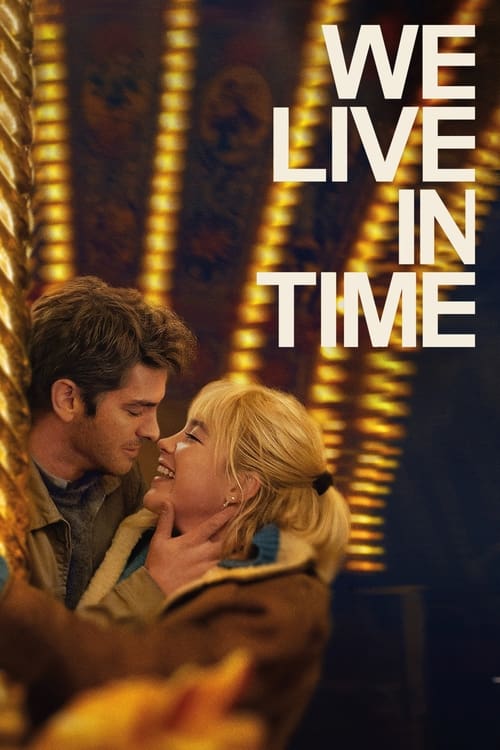We Live in Time – Film Review
Published November 24, 2024

John Crowley’s We Live in Time is an enchanting romantic comedy-drama that traverses the highs and lows of love, capturing the unvarnished complexities of human relationships. Starring Andrew Garfield and Florence Pugh, the film unfolds across a decade, using non-linear storytelling to construct a patchwork quilt of moments that are as delightful as they are poignant. With a sharp script by Nick Payne and Crowley’s deft direction, We Live in Time delivers an emotional, layered experience that lingers long after the credits roll.
The film begins with an ordinary moment that sets the stage for an extraordinary story. Tobias Durand (Andrew Garfield), a mild-mannered Weetabix representative in the midst of a divorce, inadvertently crosses paths with Almut Brühl (Florence Pugh), a spirited Bavarian-fusion chef. This seemingly random meeting, sparked by a minor accident, serves as the catalyst for a relationship that evolves through chance, passion, and profound challenges.
Rather than presenting their relationship in a straightforward chronology, We Live in Time weaves in and out of different phases of Tobias and Almut’s journey. This narrative structure mirrors the fragmented way we often remember love—not as a seamless story but as a collage of memories, arguments, reconciliations, and joys. Payne’s screenplay ensures that each timeline shift adds depth, building emotional resonance without disorienting the audience.
Andrew Garfield and Florence Pugh are magnetic, imbuing their characters with depth and humanity. Garfield brings a charming earnestness to Tobias, capturing his quiet resilience and optimism even in the face of heartbreak and uncertainty. His comedic timing adds levity to moments of tension, making him an endearing anchor for the audience.
Florence Pugh, on the other hand, is a revelation as Almut. Her portrayal is a masterclass in emotional complexity, oscillating between vulnerability and strength. Pugh captures Almut’s ambition, fears, and contradictions with remarkable nuance, making her a fully realized character. Together, Garfield and Pugh share electric chemistry, their performances grounding the film’s more whimsical moments in palpable authenticity.
At its core, We Live in Time is a meditation on resilience—both personal and relational. The film explores the messy realities of love, highlighting how two individuals with differing aspirations and fears can come together and navigate life’s unpredictability. Tobias’s longing for stability and family contrasts with Almut’s drive for professional fulfillment, creating natural tension that feels both relatable and poignant.
The film also touches on themes of mortality, parenthood, and the legacy we leave behind. Without veering into melodrama, We Live in Time examines how love can serve as both a sanctuary and a battlefield, where life’s greatest joys and sorrows converge.
Stuart Bentley‘s cinematography is both intimate and evocative, capturing the film’s emotional beats with precision. From bustling urban streets to the serene countryside, the visuals reflect the evolving dynamics of Tobias and Almut’s relationship. Particularly striking are the scenes set in Almut’s restaurant kitchen, where the chaotic energy of culinary artistry mirrors the complexities of her personal life.
Crowley’s direction ensures that these visuals are not merely decorative but integral to the storytelling. Small, quiet moments—like the way light filters into a hospital room or the tender chaos of a family farm—are imbued with meaning, creating a rich emotional tapestry.
Despite its heavy themes, We Live in Time is often laugh-out-loud funny. Payne’s screenplay deftly balances humor with heartbreak, using comedy to underline the absurdities of life without undermining its gravitas. Scenes like Tobias’s fumbling attempt to confess his love at a baby shower or Almut’s witty retorts during heated arguments provide levity, making the film’s emotional moments all the more impactful.
While the non-linear narrative is largely effective, adding layers to the characters and their story, it occasionally feels overused. Certain transitions between timelines can be jarring, momentarily pulling the audience out of the experience. However, these moments are rare and do little to detract from the film’s overall impact.
If there’s a flaw in We Live in Time, it lies in its occasional reliance on narrative convenience. Some plot developments, particularly in the third act, feel rushed or overly neat, contrasting with the organic flow of the rest of the story. These moments, while noticeable, are forgivable given the film’s emotional richness and strong performances.
The film’s score, composed by Bryce Dessner, is a standout element. From delicate piano melodies to sweeping orchestral arrangements, the music enhances the narrative without overpowering it. Key moments are elevated by the score, which mirrors the characters’ emotional journeys with remarkable subtlety.
We Live in Time is a testament to the power of storytelling that embraces life’s imperfections. Through its non-linear structure, stellar performances, and thoughtful exploration of love’s complexities, the film resonates deeply, offering a poignant reminder of the beauty and fragility of human connection. While not without its flaws, it’s a movie that invites viewers to laugh, cry, and reflect—making it a must-watch for fans of romantic dramas with substance.
